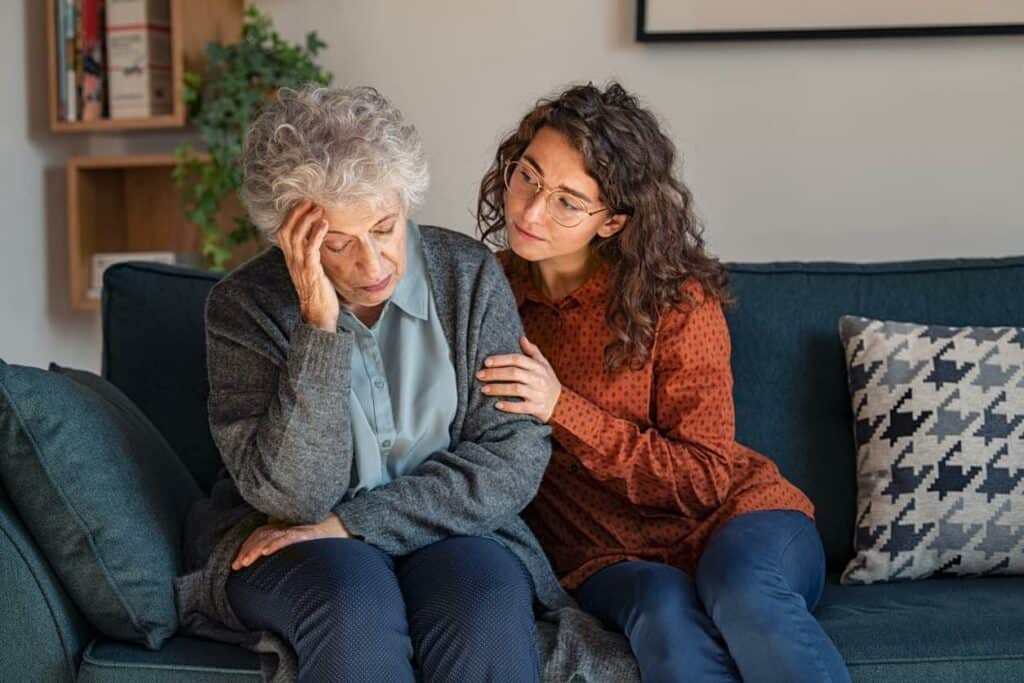
25+ Joyful Indoor Activities for Seniors That Will Transform Their Day
As seasons change in Reno and Carson City, or when mobility becomes a challenge, finding engaging indoor activities for seniors can feel like a difficult
Sometimes, a person living with Alzheimer’s disease or other forms of dementia may experience increased confusion late in the evening and through the night. This increased confusion, especially as dusk and night approaches, is known as Sundowner’s Syndrome.
Sundowners syndrome is not a disease; it has Alzheimer ‘s-related signs and symptoms, including hallucinations, difficulty sleeping, and agitation. As a caregiver, you need to understand this set of dementia-related behaviors while caring for your loved one with dementia.
A senior can also experience sundowners syndrome even without dementia, which can occur if they cope with medical issues or anesthesia.
Although its cause is widely unknown, sundowning generally occurs due to the changes in an older adult’s brain and the progression of their cognitive decline.

This article aims to help you understand what sundowner’s syndrome is, and how to help your loved one cope.
Simple and Easy To Follow Tips on How To Cope With Sundowners
A Brief Overview of What The Article Covers
Signs and Symptoms of Sundowners
Causes and Triggers of Sundowners Syndrome
Effects of Sundowners Syndrome on Seniors and Caregivers
Challenges faced by caregivers in managing sundowners
Importance of support and understanding for both seniors and caregivers
Tips For Managing Sundowners Syndrome
Sundowner’s syndrome is the name used to describe a group of behaviors, thoughts, and feelings that seniors living with Alzheimer’s or other forms of dementia experience when the sun sets.
The behavior change begins, sometimes worsens in the late afternoon, and may last through the night. However, you should note that although Sundowner’s syndrome takes place as the sun sets, sometimes it can occur at any time of the day.
Sometimes, a person with dementia will behave in ways that are difficult to understand in the late afternoon or early evening. These behavioral changes are known as ‘Sundowning.’
Sundowning can affect your loved ones
When sundowning continues into the night, it is hard for a senior and even you as their caregiver to fall asleep. Without enough sleep, you and the older adult you care for will not have enough rest and may fail to function well during the day.

Your loved one can experience Sundowners syndrome at all stages of Alzheimer’s or dementia. Studies show that over 20% of people with dementia will show signs of sundowning.
Some signs and symptoms that indicate your loved one has sundowners syndrome include the following:
Sometimes, seniors experiencing signs and symptoms of sundowning will have an urgent need to do something or go somewhere but cannot explain why they need to.
The cause of sundowning is unknown, but scientists believe it is related to brain changes in dementia patients. These changes affect a senior’s circadian rhythm, which deals with a person’s biological or internal clock. A person’s internal clock helps in sleep regulations.
When a senior’s circadian rhythm is upset, it may throw off their sleep pattern, resulting in insomnia, agitation, and other sundowners syndrome symptoms.
When your loved one’s sleep is affected and sleep deprived, the signs of their sundowning will get worse. Ensuring your loved one gets enough sleep during the day is essential.
Other causes of sundowning include
Other possible causes of sundowning are the medical condition your loved one may have, or medications your loved ones are taking. Your lloved may take different doses of medications which may have different concentrations. If your loved one takes their medicines during morning hours, they may lose their concentration at dusk.
Additionally, a noisy or chaotic environment will increase the risk of sundowning in most seniors.

The agitation, mood swings, personality changes, and irritability in a senior experiencing Sundowner syndrome can be challenging. As a caregiver, these challenges combined with other symptoms of Alzheimer’s or other forms of dementia, will make it almost impossible for your loved one to be themselves.
For most seniors, sundowning makes it unpredictable and difficult to care for them. As a caregiver, especially a family caregiver, watching your loved one lose their ability to reason and be irritable and sad can be heartbreaking.
Caregiving requires one to be understanding, passionate, and empathetic. As a caregiver, you will meet unique challenges in your day-to-day activities when caring for your loved one.
It’s okay to feel overwhelmed; sometimes, you may feel like no one understands your situation. If you don’t take care, you may feel isolated, depressed, and feel like you are all alone.
Connecting with family, friends, and existing caregiver support groups can go a long way. Asking for support from family and friends is not a sign of failure, but it shows you are willing to lean on others to offer your loved one the best care.
Other challenges may include:
Sundowner syndrome can lead to an increase in disorientation and confusion. A senior may need help to recognize people, familiar places, and even their loved ones.
A senior may need help remembering your name in the evenings, although they recognize you in the morning. This can make caring for them in the evening challenging.
The exhaustion characterized by sundowners syndrome at dusk increases their restlessness and confusion. You will note that a senior fights to sleep like a toddler. However, a senior will become more agitated, unlike a toddler, whom you can help fall asleep. Fatigue will make it difficult to put your loved one to sleep.

At dusk, a senior experiencing sundowning will be more anxious, restless, and easily agitated. Due to these behaviors, they may pace or fidget.
At other times, a senior may have repetitive behavior as night approaches. For example, your loved one may start doing dishes even if they are clean, and there is no way you can convince them that the dishes are not clean. Agitation and repetitive behavior can make it challenging to provide care.
A senior with sundowners can have hallucinations where they may hear or see things that aren’t there. As a caregiver, you must reassure them and understand what they are going through.
Mood changes are one of the most common signs of sundowning. A senior could be combative, violent, and irritable. When you think you have things under control, your loved one’s mood may evolve into violence.
Sundowning is something that is beyond your loved one’s control. You must understand they are not intentionally getting agitated, sad, or angry.
It’s crucial to remain calm, always do everything in your power, and avoid arguing. One way of helping your loved one cope with sundowning is validating their feelings and listening to them. It would help if you comfort them to make them calm. Additionally, remember to seek support when necessary. Connecting with a supportive community online through social media such as Facebook and Twitter, or physical support groups can also provide a good source of information and emotional support.
Despite no targeted treatment options for sundowners syndrome, some alternative strategies can help you cope with your loved one’s signs.
Since certain activities can trigger sundowning. Recording all the triggers, like loud noises, fatigue, or exhausting activities, is essential. You can keep a journal or phone to record what action worsens your loved ones’ sundowners syndrome.
Once you’ve established which activities escalate your loved one’s sundowning, you can develop a mechanism to help you avoid them altogether.

It would be best to create their daily schedule during daylight hours, as this will help keep their circadian rhythm on track.
A structured daily schedule will reduce anxiety and surprises that may confuse your loved one. Ensure They have their exercise early on if they exercise. Help them avoid napping late in the day.
For some seniors, their sundowning may be due to optical confusion. For example, your loved one may be confused due to headlights moving across their blinds. You can overcome this challenge by installing light-blocking curtains on the blinds, minimizing confusion and anxiety.
Offering dinner after dusk can disrupt a senior’s sleeping pattern. Have them have dinner early and provide a light snack before sleeping.
Walking is beneficial as it allows your loved ones to soak up sunlight, get fresh air, and reduce pent-up energy.
Caffeine intake late in the day can trigger anxiety and cause insomnia, accelerating sundowners syndrome. You can help your loved one by ensuring they don’t consume too much caffeine after dusk.
Be calm and gentle with your loved one. When addressing them, use a peaceful tone and try to validate their feelings. You can put on some relaxing music or engage in relaxing activities. Do not argue with a senior during a “sundowners episode,” as this could quickly escalate to frustration or violence.
Caring for a loved one with sundowners can be challenging, especially when they have trouble falling asleep. Melatonin is a natural and gentle food supplement that can help your loved one fall asleep quickly.
Considering your loved ones’ behavior, look for a room where they are comfortable. You can do this by checking where they feel safe and converting the space into their bedroom. Ensure you keep their bedside light on and in any other room where they may tend to wander during the night. This will reduce confusion, anxiety, and fear.
Try to control the noise in their rooms late in the afternoon. You can do this by reducing the volume of the TV and other entertainment devices. Also, try to minimize visitation late in the afternoon as this may increase a senior’s agitation.
Installation of light therapy helps lessen the effects of sundowning and dementia, particularly depression and isolation. As dusk approaches, ensure all the rooms are well-lit, as this will reduce the number of shadows, which can be confusing to an older adult with dementia.
Sometimes, if Sundowners syndrome is severe, you can seek medical interventions from your loved one’s healthcare providers. Most medical practitioners advise using medications to manage sundowners after trying other treatment options. Before starting any treatment, remember to discuss the side effects to expect. Then, if the benefits outweigh the side effects, you can opt for the treatment. Your loved one’s doctor may prescribe the following medical interventions when the results of sundowning are too severe:
At other times, consider moving your loved ones into an assisted living facility if you realize you are not in a position to offer the help they require. Some assisted living homes provide an ideal environment for seniors with dementia and experiencing sundowners.
At Amy’s Eden, we ensure that our homes are the ideal place for seniors, irrespective of their medical conditions including sundowing. Each resident space is designed with their comfort in mind and personalized to help manage their symptoms. Additionally, our caregivers are trained to provide adequate care to help your loved one cope with sundowning.

Sundowners refers to the change in behavior you notice in your aging loved one as dusk approaches, like agitation, irritability, and confusion. Although sundowning is mainly common to seniors living with Alzheimer’s and other forms of dementia, in some rare cases, it can be exhibited in people without dementia.
While sundowners don’t have a cure or a specific treatment, you can still help manage your loved one’s signs by ensuring they exercise earlier in the day, avoid late evening visitations, have soothing music in their rooms, and limit sleep disruptions.
If you are struggling and wondering how to provide the best care for your loved one, don’t hesitate to contact us with any questions about our dementia care services; we will be glad to help.
Get care >

As seasons change in Reno and Carson City, or when mobility becomes a challenge, finding engaging indoor activities for seniors can feel like a difficult
Family Survey Please share your honest feedback to help us improve the care and safety of your loved one.
Professional Senior In-Home Care in Carson City Keep your loved one in the comfort of their cherished home. Amy’s Eden delivers exceptional senior care services

The Best Home Care in Reno, NV The comfort of your home, the quality of Eden. We provide compassionate, professional in-home care services for seniors

Amy's Eden Senior Care © 2023